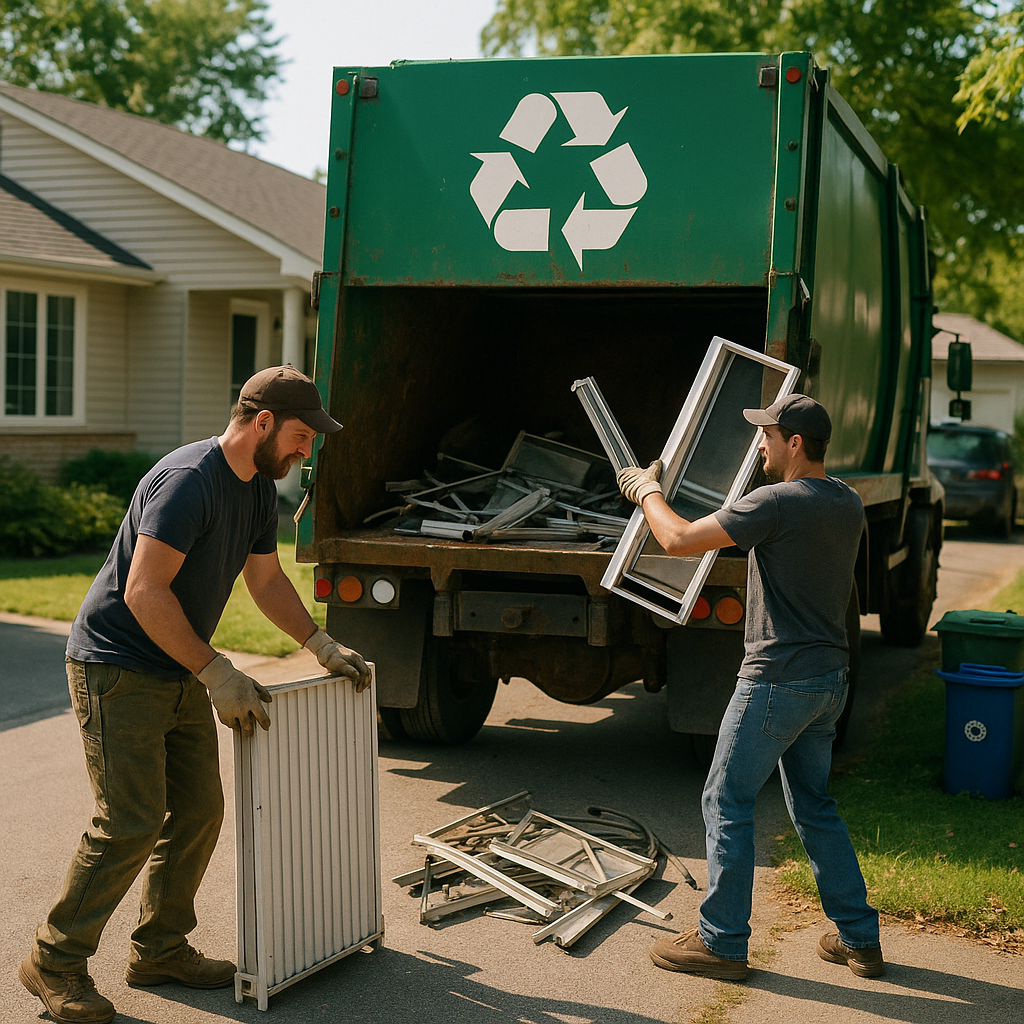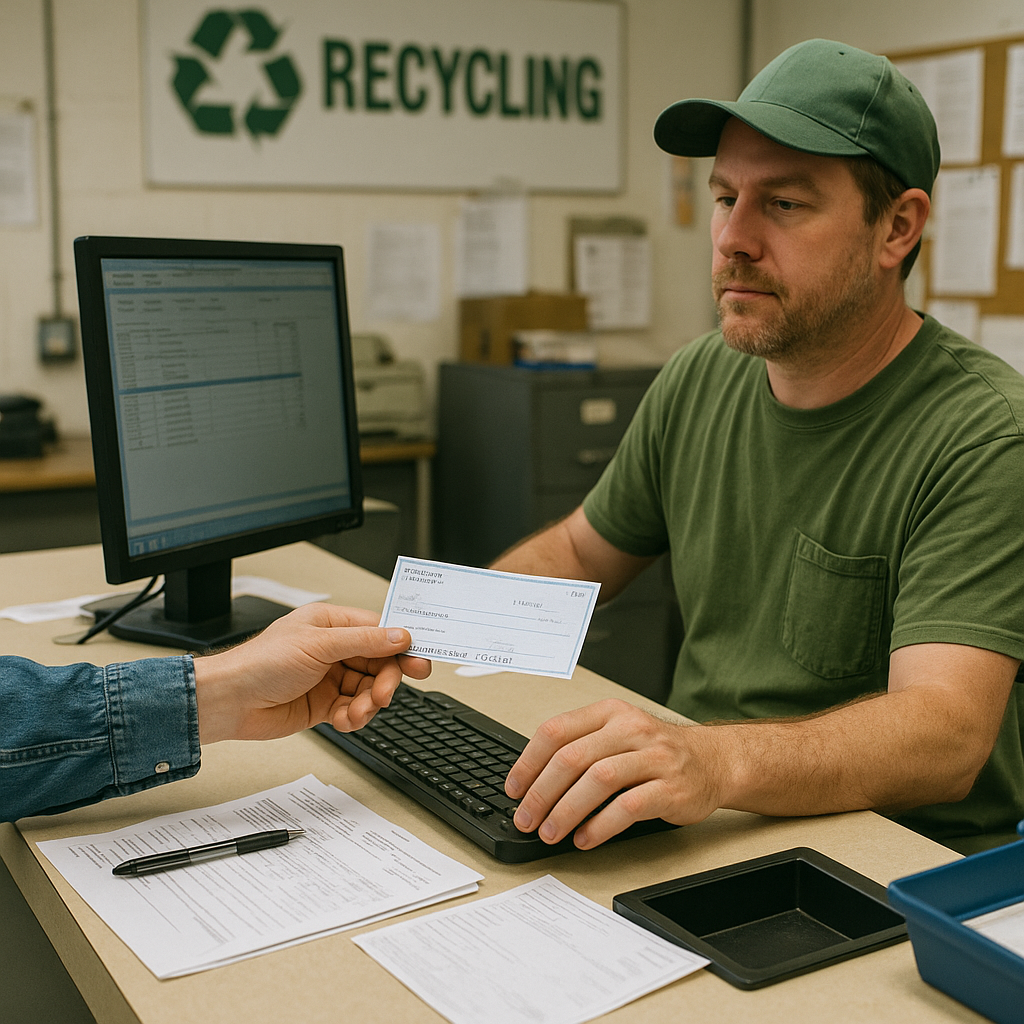5901 Botham Jean Blvd, Dallas, TX 75215
Commercial Scrap Recycling Policies: A Quick Guide
August 17, 2025Commercial scrap recycling policies are the regulations and guidelines that govern how businesses manage, process, and recycle scrap metal. These comprehensive frameworks establish the rules for collecting, processing, and selling recyclable metal materials in the commercial sector. They create a structured system to protect both businesses and the environment while supporting resource conservation efforts.
These policies tackle multiple critical concerns within the recycling ecosystem. They help prevent metal theft through identification requirements and transaction documentation and establish environmental safeguards to prevent contamination from hazardous materials. Furthermore, they promote accountability through licensing, record-keeping, and reporting standards, ensuring transparency throughout the recycling process.
The implementation of these policies varies across jurisdictions. Federal agencies like the EPA set baseline standards, while state and local governments often add additional requirements based on regional needs. What remains consistent is their core purpose: ensuring the responsible recovery of valuable metal resources while minimizing the environmental impact.
What Federal Agencies Oversee Commercial Scrap Recycling?

Two primary federal agencies oversee commercial scrap metal recycling operations in the United States. The U.S. Environmental Protection Agency (EPA) and the Federal Motor Carrier Safety Administration (FMCSA) establish and enforce regulations that govern different aspects of the industry’s operations.
Environmental Protection Agency (EPA)
The EPA is the principal federal agency responsible for environmental oversight of scrap metal recycling facilities. Its regulations ensure that recycling operations minimize harm to air, water, and soil quality. The agency has established comprehensive frameworks that guide how recyclers must handle potentially hazardous materials.
Key EPA responsibilities related to scrap recycling include:
- Administering the Resource Conservation and Recovery Act (RCRA), which defines what materials qualify as hazardous waste and establishes management standards for these materials
- Enforcing the Clean Air Act provisions that regulate emissions from metal shredding and processing equipment
- Overseeing Clean Water Act compliance through stormwater permits that prevent contaminated runoff from outdoor recycling operations
- Providing exclusions for certain recycled materials from hazardous waste regulations to encourage proper recycling practices
For large commercial scrap operations, the EPA’s Clean Air Act regulations are particularly significant. Metal shredding creates intense heat that can vaporize non-metal materials and fluids, producing volatile organic compound (VOC) emissions and particulate matter that affect air quality. Facilities operating large shredders must implement control systems to capture and neutralize these emissions.
Federal Motor Carrier Safety Administration (FMCSA)
The FMCSA, part of the U.S. Department of Transportation (DOT), focuses on the transportation aspects of scrap metal recycling. This agency ensures that transporting scrap materials across highways and roads is safe and complies with federal standards.
The FMCSA’s key oversight areas include:
- Regulating commercial motor vehicles used to transport scrap metal between collection points, processing facilities, and end users
- Establishing safety requirements for vehicles carrying heavy loads of metal and other recyclable materials
- Enforcing hours-of-service regulations for drivers transporting scrap materials
- Overseeing the proper documentation and handling of potentially hazardous materials during transport
- Conducting inspections and compliance reviews of commercial carriers in the recycling industry
For scrap metal businesses with their own transportation fleets, FMCSA compliance is a critical operational consideration. Companies must maintain proper licensing, insurance, and safety records for their vehicles and drivers.
Coordination Between Agencies
While the EPA and FMCSA have distinct regulatory domains, their oversight often intersects in the scrap recycling industry. For example, materials classified as hazardous under EPA guidelines require special handling during transportation under FMCSA rules. This regulatory overlap necessitates that scrap metal recyclers develop comprehensive compliance programs addressing both environmental and transportation requirements.
Additionally, both agencies work with state-level counterparts to implement and enforce regulations. Many states have their own environmental agencies and transportation departments that may impose additional, sometimes more stringent, requirements on scrap metal recyclers operating within their jurisdictions.
Commercial scrap recyclers must stay informed about changing regulations from both agencies, as non-compliance can result in significant penalties, operational restrictions, and reputational damage. Regular audits of environmental and transportation practices help ensure continuous compliance with these complex federal requirements.
How Do State-Level Policies Impact Commercial Scrap Recyclers?

State regulations often add an extra layer of compliance requirements for commercial scrap recyclers beyond federal mandates. These state-specific policies can significantly shape operational practices, waste management protocols, and reporting obligations for recycling businesses.
In California, the regulatory landscape is particularly complex with multiple state agencies exercising oversight. The Department of Toxic Substances Control (DTSC) serves as the primary authority for hazardous waste management related to scrap metal operations. The DTSC enforces stringent rules regarding the handling, storage, and processing of potentially hazardous materials found in scrap, such as automotive fluids, batteries, and certain metal compounds.
CalRecycle provides another layer of oversight, managing the state’s ambitious recycling targets and programs. For commercial scrap recyclers, this means compliance with specific requirements like the Mandatory Commercial Recycling law, which mandates businesses generating four cubic yards or more of waste weekly to arrange for recycling services. CalRecycle also administers the covered electronic waste (CEW) recovery and recycling program, directly impacting how scrap recyclers must handle e-waste components.
The California State Water Resources Control Board also regulates storm water management at industrial sites, including scrap metal recycling facilities. This requires implementing containment systems and water quality monitoring to prevent contamination from metal particulates and other pollutants.
California’s approach is particularly impactful because it often exceeds federal standards. While federal regulations exempt certain scrap metal from hazardous waste classification to promote recycling, California has taken a more nuanced approach. For instance, in 1984, California declared auto shredder waste (fluff) a hazardous waste requiring safe disposal—a designation not made at the federal level.
These comprehensive state policies create both challenges and opportunities for commercial scrap recyclers. Compliance demands significant investment in infrastructure, training, and administrative resources. However, facilities that successfully navigate these requirements gain a market advantage through certified compliance and access to state-specific recycling programs.
Local enforcement agencies may impose additional permitting or reporting requirements based on stricter local environmental and public health protections. Certified Unified Program Agencies (CUPAs) consolidate the administration of various environmental programs at the local level, providing another regulatory touchpoint for scrap recyclers.
What Are Key Compliance Requirements for Commercial Scrap Recyclers?

Commercial scrap recyclers operate under a framework of stringent regulations designed to combat metal theft, protect the environment, and ensure proper business practices. Compliance requirements vary by state and local jurisdiction but typically share common elements that recyclers must follow to maintain their legal standing.
Record-Keeping Requirements
Comprehensive documentation is the cornerstone of regulatory compliance for scrap metal recyclers. Most jurisdictions require businesses to maintain detailed transaction records, which include:
- Date and time of each transaction
- Complete description of materials purchased
- Weight and quantity of each material type
- Amount paid and payment method used
- Photographs of the material in many areas
These records must typically be retained for a specified period, often between 2-5 years, and made available to law enforcement upon request. Many facilities now use specialized software systems to streamline this process while ensuring compliance with state-specific reporting requirements.
Seller Identification Verification
To prevent the trafficking of stolen materials, recyclers must verify and document the identity of individuals selling scrap metal. Compliance typically requires vendors to present a valid government-issued photo ID, which is then recorded and associated with the purchase ticket. Many facilities implement systems including:
- Driver’s license scanning technology that captures and stores identification data
- License plate documentation of delivery vehicles
- Signature or thumbprint capture systems linked to specific transactions
- Digital photography systems that create visual records of sellers and materials
These identification measures create a documented chain of custody that helps authorities track potentially stolen materials and serves as a significant deterrent to metal theft.
Payment Restrictions
Many states have implemented strict regulations regarding how scrap metal sellers can be paid. These restrictions typically include:
- Limitations or prohibition on cash payments for certain high-theft risk materials
- Requirements to pay by check, electronic transfer, or prepaid debit card
- Mandatory waiting periods, often 3 days, before payment can be issued for transactions over specific value thresholds
- Special documentation requirements for particularly vulnerable items like catalytic converters
These payment restrictions create a paper trail that helps prevent money laundering and discourage the sale of stolen goods. Different states implement varying levels of restriction, with California having some of the most stringent requirements in the nation.
Environmental Compliance
Scrap metal recycling facilities must also adhere to environmental regulations at federal, state, and local levels:
- Clean Air Act requirements for facilities operating metal shredders
- Clean Water Act regulations for stormwater management and discharge permits
- Resource Conservation and Recovery Act (RCRA) guidelines for hazardous waste handling
- Local environmental ordinances that may impose additional requirements
Non-compliance with environmental regulations can result in significant penalties, including substantial fines and potential facility closure. In 2020, a scrap metal shredder in one state faced over $2 million in penalties after operating without proper environmental permits and controls.
Licensing and Registration
Commercial scrap recyclers typically need to obtain various licenses and permits to operate legally:
- State-specific recycler registration, often with the Department of Justice
- Weighmaster licenses if using scales to determine payment amounts
- Local business permits and zoning approvals
- Special certifications for handling specific materials
The licensing process can take several weeks to months and usually involves background checks, facility inspections, and ongoing compliance reporting.
Prohibited Materials Management
Recyclers must implement systems to identify and reject materials that cannot be legally purchased, including:
- Infrastructure items like street signs, manhole covers, and utility equipment
- Transportation-related materials such as railroad equipment and guardrails
- Commemorative items, including cemetery plaques and historical markers
- Items requiring special documentation, such as catalytic converters without proper ownership proof
Staff training programs are essential to ensure all employees can recognize these prohibited materials and understand the legal requirements for rejecting them.
Anti-Theft Reporting
Many jurisdictions require scrap metal recyclers to proactively report suspicious transactions and cooperate with law enforcement:
- Regular data submissions to systems like Leads Online, BWI, and similar law enforcement databases
- Immediate reporting of suspected stolen materials
- Participation in ‘tag and hold’ programs that require segregating suspicious items for law enforcement inspection
- Cooperation with police investigations through records access and witness statements
These reporting requirements create a partnership between recyclers and law enforcement to combat metal theft effectively.
By maintaining robust compliance systems across all these areas, commercial scrap recyclers can operate confidently within legal boundaries while contributing to environmental sustainability and theft prevention efforts. Facilities that neglect compliance requirements face substantial risks, including fines, business interruption, and even forced closure.
Conclusion: Commercial Scrap Recycling Policies

Adhering to commercial scrap recycling policies is not just a legal obligation. It demonstrates a commitment to responsible business practices that benefit both your company and the environment. Federal, state, and local regulations are designed to protect natural resources, prevent illegal activities like metal theft, and ensure the proper handling of potentially hazardous materials. By implementing comprehensive compliance strategies, businesses can avoid costly fines and legal complications while supporting environmental conservation efforts.
Responsible scrap recycling offers multiple advantages beyond regulatory compliance. Companies that manage their recyclable materials effectively can generate new revenue streams from previously discarded resources and reduce operational costs through improved waste management processes. Furthermore, businesses that prioritize environmental responsibility enhance their corporate image and build stronger relationships with environmentally conscious consumers and partners.
For guidance on commercial metal recycling and to implement effective recycling programs for your business, contact Okon Recycling at 214-717-4083.
